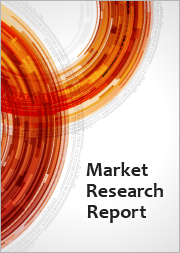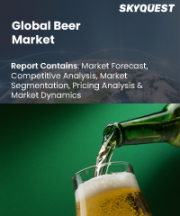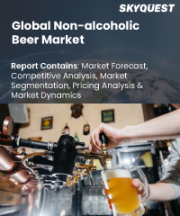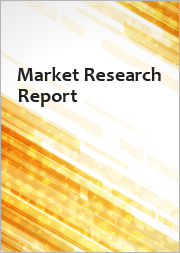
|
시장보고서
상품코드
1520612
무알코올 맥주 시장 평가 : 제품별, 기술별, 카테고리별, 유통 채널별, 지역별, 기회, 예측(2017-2031년)Non-Alcoholic Beer Market Assessment, By Product, By Technology, By Category, By Distribution Channel, By Region, Opportunities and Forecast, 2017-2031F |
||||||
세계의 무알코올 맥주 시장 규모는 예측 기간인 2024-2031년 CAGR이 5.31%에 달하며, 2023년 235억 1,000만 달러에서 2031년에는 355억 6,000만 달러로 성장할 것으로 예측됩니다. 이 시장은 최근 수년간 괄목할 만한 성장세를 보였으며, 앞으로도 견고한 성장세를 유지할 것으로 예상됩니다.
무알코올 라이프스타일 선택에 대한 선호도가 높아짐에 따라 건강한 삶과 배려하는 소비 습관으로의 광범위한 변화를 반영하고 있으며, 피트니스 및 스포츠 문화의 영향력이 커지면서 무알코올 맥주를 포함한 건강한 음료 선택으로 전환하는 데 불을 지폈습니다. 무알콜 음료 산업에 대한 정부의 지원은 무알콜 맥주와 같은 제품의 분위기를 형성하는 데 중요한 역할을하여 시장 성장을 주도하고 있습니다.
무알콜 맥주는 보통 알코올 도수가 0.5% 미만으로 최소한의 알코올만 함유하고 있습니다. 일반 맥주와 동일한 원료와 양조 방식으로 만들어지지만 감압증류, 역삼투막 등의 방법으로 알코올을 제거하거나 감소시킵니다. 특히 건강을 중시하고 기존 주류의 대안을 찾는 경향이 강한 밀레니얼 세대와 Z세대 사이에서 이러한 동향가 강세를 보이고 있습니다.
시장 성장의 원동력은 양조 기술의 발전으로 기존 음료와 거의 동일한 맛을 내는 무알콜 맥주를 생산할 수 있게된 것입니다. 또한 온라인 판매를 포함한 유통 채널도 시장 성장을 촉진하고 있습니다.
세계의 무알코올 맥주 시장에 대해 조사했으며, 시장 개요와 제품별, 기술별, 카테고리별, 유통 채널별, 지역별 동향 및 시장에 참여하는 기업의 개요 등을 제공하고 있습니다.
목차
제1장 조사 방법
제2장 프로젝트 범위와 정의
제3장 개요
제4장 고객의 소리
제5장 세계의 무알코올 맥주 시장 전망, 2017-2031년
- 시장 규모와 예측
- 제품별
- 기술별
- 카테고리별
- 유통 채널별
- 지역별
- 기업별 시장 점유율(%), 2023년
제6장 세계의 무알코올 맥주 시장 전망, 지역별, 2017-2031년
- 북미
- 유럽
- 아시아태평양
- 남미
- 중동 및 아프리카
제7장 시장 지도제작, 2023년
제8장 거시환경과 산업구조
- 수요공급 분석
- 수출입 분석
- 밸류체인 분석
- PESTEL 분석
- Porter's Five Forces 분석
제9장 시장 역학
제10장 주요 참여 기업 상황
제11장 가격 분석
제12장 사례 연구
제13장 주요 참여 기업 전망
- Bravus Brewing Company
- Rodinny pivovar BERNARD a. s.
- Anheuser-Busch InBev SA
- Bayerische Staatsbrauerei Weihenstephan
- Booze Free
- Carlsberg Breweries A/S
- Kirin Holdings Company Limited
- Moscow Brewery Company
- Partake Brewing
- Hill Street Beverage Company Inc
- Big Drop Brewing Co.
제14장 전략적 제안
제15장 문의와 면책사항
KSA 24.07.31Global non-alcoholic beer market is projected to witness a CAGR of 5.31% during the forecast period 2024-2031, growing from USD 23.51 billion in 2023 to USD 35.56 billion in 2031. The market has experienced significant growth in recent years and is expected to maintain a strong pace of expansion in the coming years.
The rising preference for alcohol-free lifestyle choices reflects a broader shift towards healthier living and mindful consumption habits, the growing influence of fitness and sports culture has sparked a shift towards healthier beverage choices, including non-alcoholic beer, and government support for the non-alcoholic beverages industry playing an important role in shaping the landscape for products such as non-alcoholic beer, driving the market growth. Non-alcoholic beer contains a minimal amount of alcohol, usually less than 0.5% alcohol by volume. It is made using similar ingredients and brewing as regular beer, but the alcohol is removed or reduced through methods such as vacuum distillation or reverse osmosis. Also, the trend is strong among millennials and Gen-Z, who prioritize wellness and are more inclined to seek alternatives to traditional alcoholic beverages.
The market growth is fueled by advancements in brewing technology, allowing the production of non-alcoholic beers that closely provide the same taste as traditional beverages. Also, distribution channels. including online sales, drive the market growth.
As of 2022, global beer consumption was around 190 million KL. China is the largest beer consumer in 2022. Growing consumer health awareness towards healthy beverages will drive people towards non-alcoholic beverage consumption.
Rising Preference for Alcohol-Free Lifestyle
The rising preference for alcohol-free lifestyle choices reflects a broader shift towards healthier living and mindful consumption habits. Non-alcoholic beer emerges as a compelling option for individuals seeking to enjoy the social aspects of drinking without the adverse health effects associated with alcohol. The preference is driven by various factors, such as increasing awareness of the impacts of excessive alcohol consumption on physical and mental well-being, as well as changing social norms that value moderation and wellness. Non-alcoholic beer offers a satisfying alternative, allowing consumers to participate in social gatherings, enjoy flavorful beverages, and adhere to personal health goals simultaneously. With improved taste profiles and a diverse range of options available, non-alcoholic beer has become increasingly appealing to health-conscious individuals, athletes, pregnant women, designated drivers, and those simply looking to reduce their alcohol intake. As a result, it occupies a significant and growing segment within the beverage market, catering to the evolving preferences of modern consumers.
It has been observed that, as of January 2024, around 50% of New York's Generation Z cohort group expressed intentions to reduce their alcohol consumption.
Growing Influence of Fitness and Sports Culture
The growing influence of fitness and sports culture has sparked a shift towards healthier beverage choices, including non-alcoholic beer. Athletes and fitness enthusiasts are conscious of their nutritional intake, seeking alternatives to traditional alcoholic drinks that go with their active lifestyles. Non-alcoholic beer presents an attractive option as it allows individuals to enjoy a refreshing drink without compromising their fitness goals or recovery efforts. Moreover, the presence of isotonic properties in non-alcoholic beers, which aid in hydration and replenishment of electrolytes, has made them increasingly popular among athletes.
In addition, the association of non-alcoholic beer with post-workout recovery and hydration has been embraced by sports communities, further driving its adoption. As a result, non-alcoholic beer has become primary in gyms, fridges, sports events, and health-conscious gatherings, catering to the preferences of consumers who prioritize both physical fitness and social enjoyment.
For instance, in December 2023, Belgium-based beer company, Thrive, launched a healthy beer, Thrive Play, which contains ten vitamins, including 50% of the recommended daily intake of vitamin D3 and B vitamins per can. It aims to expand the target audience beyond people doing sports, for which it previously developed an alcohol-free sports beer with 10 grams of protein per can.
Government Support for Non-Alcoholic Beverages Industry
Government support for the non-alcoholic beverages industry plays a vital role in shaping the landscape for products such as non-alcoholic beer. The support can manifest in various forms, including regulatory frameworks, tax incentives, and public health campaigns. Governments may implement policies that encourage the production and consumption of non-alcoholic beverages as part of broader initiatives to promote health and well-being within their populations. Such policies can include funding for research into alcohol alternatives, grants for businesses specializing in non-alcoholic beverages, and subsidies for ingredients used in their production. In addition, regulatory bodies provide guidelines for labeling and marketing non-alcoholic beverages to ensure transparency and consumer safety. Governments contribute to expanding consumer access to healthier beverage options and supporting economic development within the sector by fostering an environment conducive to the growth of the non-alcoholic beer industry.
For instance, in September 2023, the Office for Health Improvement (OHID) in the Department of Health and Social Care (DHSC) of the United Kingdom consulted on updating guidance on low-alcohol descriptors. It aims to increase the substitution of alcoholic drinks with alcohol-free or low-alcohol (NoLo) alternatives among people who drink above low-risk levels. The chief medical officer of the United Kingdom provided the low-risk drinking guidelines on the label and alternative ways of communicating this information to consumers.
Europe Dominates Non-Alcoholic Beer Market
Europe dominates the global non-alcoholic beer market due to a cultural shift toward a healthy lifestyle and reduced alcohol consumption, boosting the demand for non-alcoholic beer. In addition, stringent regulations on alcohol consumption while driving have further incentivized the adoption of non-alcoholic beverages. Furthermore, Europe has a rich brewing tradition from centuries and a sophisticated palate, fostering the development of high-quality non-alcoholic beer options that cater to distinguishing consumers. Also, the marketing strategies and investments made by global non-alcoholic beer companies and investments by these companies in Europe, combined with the increasing popularity of western drinking habits, have solidified the region's dominating position in the global non-alcoholic beer market.
For instance, in July 2023, Anheuser-Busch InBev SA invested USD 33.69 million (EUR 31 million) in technology upgrades for the brewing of non-alcoholic beers. The investment aims to expand the company's no-alcohol beer portfolio to improve bottling capabilities and optimize a new de-alcoholizing system.
Future Market Scenario (2024 - 2031F)
Working on production costs and providing customized solutions based on their preference with premium product positioning is expected to drive the global non-alcoholic beer market growth.
Innovative advancements in the method of flavor mixing by machines will save time for beer producers and manufacturers, encouraging competitiveness among the market players, which is expected to help drive the market growth.
Managing supply chain distribution on niche markets and local levels, such as retail stores creating ease of availability to the customers boosts market growth.
Key Players Landscape and Outlook
Key participants in the global non-alcoholic beer market are involved in continuous innovation, characterizing this landscape as these companies compete to outperform one another in terms of taste and type. The market prognosis remains positive, and with the rising adoption of strategies by key players, the market is expected to rise over the projected horizon. Non-alcoholic beer manufacturers are concerned with supply chain resilience, product quality, and variety, which is expected to define the industry's future. Collaborations and developing technologies are projected to increase competition in the fast-paced market.
For instance, in January 2024, Anheuser-Busch InBev SA made history by becoming the first-ever global beer sponsor for the next three Olympics and Paralympic Games. With a significant move, the company promoted its non-alcoholic brand, Corona Cero, globally. The strategic choice aligns with Anheuser-Busch InBev SA and the International Olympic Committee's shared commitment to responsible consumption, aiming to convey messages of connection, moderation, and celebration to billions of Olympic fans worldwide.
In February 2024, SLAB Ventures Netherlands and Anheuser-Busch InBev SA India launched D'YAVOL's first travel retail showcase at Mumbai's Chhatrapati Shivaji Maharaj International Airport. The collaboration between SLAB Ventures Netherlands and Anheuser-Busch InBev SA India is a strategic move into the travel retail sector.
Table of Contents
1. Research Methodology
2. Project Scope and Definitions
3. Executive Summary
4. Voice of Customer
- 4.1. Demographics (Age/Cohort Analysis-Baby Boomers and Gen X, Millennials, Gen Z; Gender. Income-Low, Mid, and High; Geography; Nationality; etc.)
- 4.2. Market Awareness and Loyalty
- 4.3. Factors Considered in Purchase Decision
- 4.3.1. Taste
- 4.3.2. Aroma
- 4.3.3. Ingredients
- 4.3.4. Variety
- 4.3.5. Origin
- 4.3.6. Parings
- 4.3.7. Brand
- 4.3.8. Price
- 4.3.9. Reviews
- 4.3.10. Offer and Discounts
- 4.4. Purpose of Purchase
- 4.5. Medium of Purchase
- 4.6. Frequency of Purchase
- 4.7. Role of Brand Ambassador or Influencer Marketing on Product/Brand Absorption
5. Global Non-Alcoholic Beer Market Outlook, 2017-2031F
- 5.1. Market Size & Forecast
- 5.1.1. By Value
- 5.1.2. By Volume
- 5.2. By Product
- 5.2.1. Alcohol-Free
- 5.2.2. 0.5% Alcohol by Volume
- 5.3. By Technology
- 5.3.1. Restricted Fermentation
- 5.3.2. Reverse Osmosis
- 5.4. By Category
- 5.4.1. Plain
- 5.4.2. Flavored
- 5.5. By Distribution Channel
- 5.5.1. Online
- 5.5.1.1. E-Commerce Websites
- 5.5.1.2. Company Owned Websites
- 5.5.2. Offline
- 5.5.2.1. Supermarket/Hypermarket
- 5.5.2.2. Specialty Stores
- 5.5.2.3. Others
- 5.5.1. Online
- 5.6. By Region
- 5.6.1. North America
- 5.6.2. Europe
- 5.6.3. Asia-Pacific
- 5.6.4. South America
- 5.6.5. Middle East and Africa
- 5.7. By Company Market Share (%), 2023
6. Global Non-Alcoholic Beer Market Outlook, By Region, 2017-2031F
- 6.1. North America*
- 6.1.1. Market Size & Forecast
- 6.1.1.1. By Value
- 6.1.1.2. By Volume
- 6.1.2. By Product
- 6.1.2.1. Alcohol-Free
- 6.1.2.2. 0.5% Alcohol by Volume
- 6.1.3. By Technology
- 6.1.3.1. Restricted Fermentation
- 6.1.3.2. Reverse Osmosis
- 6.1.4. By Category
- 6.1.4.1. Plain
- 6.1.4.2. Flavored
- 6.1.5. By Distribution Channel
- 6.1.5.1. Online
- 6.1.5.1.1. E-Commerce Websites
- 6.1.5.1.2. Company Owned Websites
- 6.1.5.2. Offline
- 6.1.5.2.1. Supermarket/Hypermarket
- 6.1.5.2.2. Specialty Stores
- 6.1.5.2.3. Others
- 6.1.5.1. Online
- 6.1.6. United States*
- 6.1.6.1. Market Size & Forecast
- 6.1.6.1.1. By Value
- 6.1.6.1.2. By Volume
- 6.1.6.2. By Product
- 6.1.6.2.1. Alcohol-Free
- 6.1.6.2.2. 0.5% Alcohol by Volume
- 6.1.6.3. By Technology
- 6.1.6.3.1. Restricted Fermentation
- 6.1.6.3.2. Reverse Osmosis
- 6.1.6.4. By Category
- 6.1.6.4.1. Plain
- 6.1.6.4.2. Flavored
- 6.1.6.5. By Distribution Channel
- 6.1.6.5.1. Online
- 6.1.6.5.1.1. E-Commerce Websites
- 6.1.6.5.1.2. Company Owned Websites
- 6.1.6.5.2. Offline
- 6.1.6.5.2.1. Supermarket/Hypermarket
- 6.1.6.5.2.2. Specialty Stores
- 6.1.6.5.2.3. Others
- 6.1.6.5.1. Online
- 6.1.6.1. Market Size & Forecast
- 6.1.7. Canada
- 6.1.8. Mexico
- 6.1.1. Market Size & Forecast
All segments will be provided for all regions and countries covered
- 6.2. Europe
- 6.2.1. Germany
- 6.2.2. France
- 6.2.3. Italy
- 6.2.4. United Kingdom
- 6.2.5. Russia
- 6.2.6. Netherlands
- 6.2.7. Spain
- 6.2.8. Turkey
- 6.2.9. Poland
- 6.3. Asia-Pacific
- 6.3.1. India
- 6.3.2. China
- 6.3.3. Japan
- 6.3.4. Australia
- 6.3.5. Vietnam
- 6.3.6. South Korea
- 6.3.7. Indonesia
- 6.3.8. Philippines
- 6.4. South America
- 6.4.1. Brazil
- 6.4.2. Argentina
- 6.5. Middle East and Africa
- 6.5.1. Saudi Arabia
- 6.5.2. UAE
- 6.5.3. South Africa
7. Market Mapping, 2023
- 7.1. By Product
- 7.2. By Technology
- 7.3. By Category
- 7.4. By Distribution Channel
- 7.5. By Region
8. Macro Environment and Industry Structure
- 8.1. Demand Supply Analysis
- 8.2. Import Export Analysis
- 8.3. Value Chain Analysis
- 8.4. PESTEL Analysis
- 8.4.1. Political Factors
- 8.4.2. Economic System
- 8.4.3. Social Implications
- 8.4.4. Technological Advancements
- 8.4.5. Environmental Impacts
- 8.4.6. Legal Compliances and Regulatory Policies (Statutory Bodies Included)
- 8.5. Porter's Five Forces Analysis
- 8.5.1. Supplier Power
- 8.5.2. Buyer Power
- 8.5.3. Substitution Threat
- 8.5.4. Threat from New Entrant
- 8.5.5. Competitive Rivalry
9. Market Dynamics
- 9.1. Growth Drivers
- 9.2. Growth Inhibitors (Challenges and Restraints)
10. Key Players Landscape
- 10.1. Competition Matrix of Top Five Market Leaders
- 10.2. Market Revenue Analysis of Top Five Market Leaders (By Value, 2023)
- 10.3. Mergers and Acquisitions/Joint Ventures (If Applicable)
- 10.4. SWOT Analysis (For Five Market Players)
- 10.5. Patent Analysis (If Applicable)
11. Pricing Analysis
12. Case Studies
13. Key Players Outlook
- 13.1. Bravus Brewing Company
- 13.1.1. Key Management Personnel
- 13.1.2. Products and Services
- 13.1.3. Financials (As Reported)
- 13.1.4. Key Market Focus and Geographical Presence
- 13.1.5. Recent Developments
- 13.2. Rodinny pivovar BERNARD a. s.
- 13.3. Anheuser-Busch InBev SA
- 13.4. Bayerische Staatsbrauerei Weihenstephan
- 13.5. Booze Free
- 13.6. Carlsberg Breweries A/S
- 13.7. Kirin Holdings Company Limited
- 13.8. Moscow Brewery Company
- 13.9. Partake Brewing
- 13.10. Hill Street Beverage Company Inc
- 13.11. Big Drop Brewing Co.
Companies mentioned above DO NOT hold any order as per market share and can be changed as per information available during research work.

















